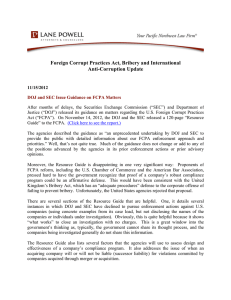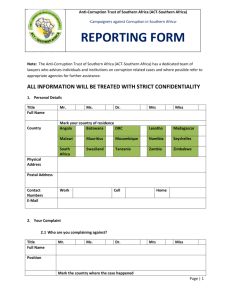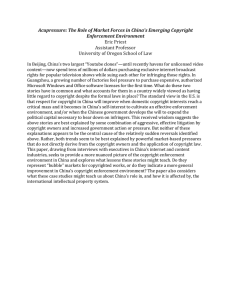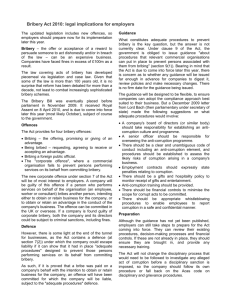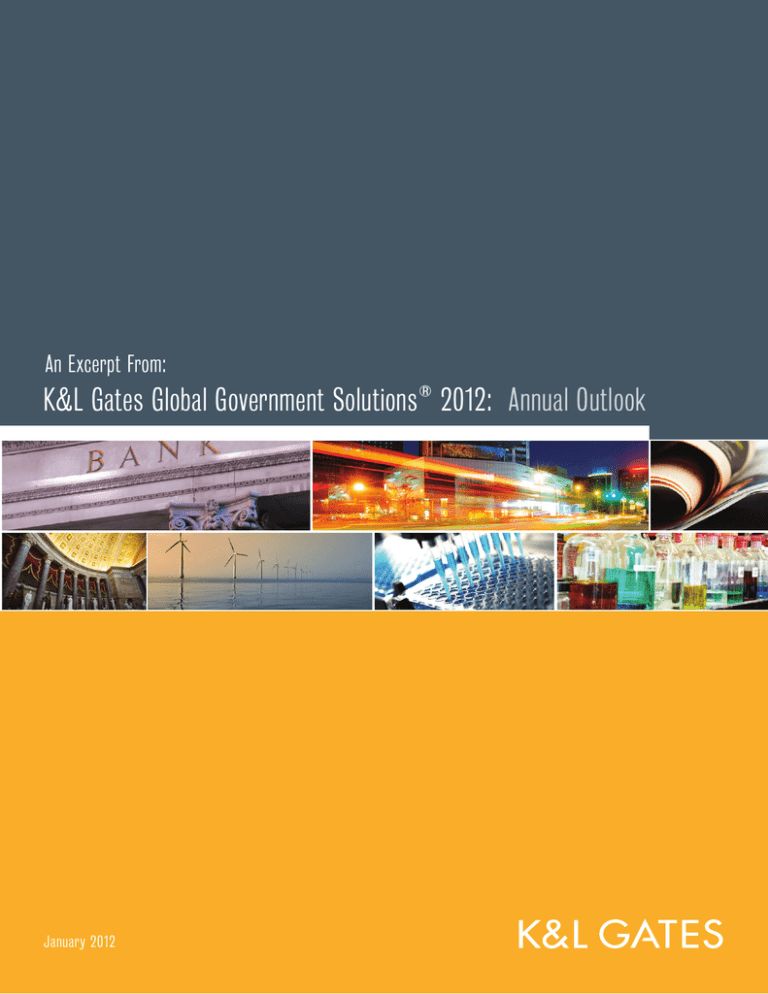
An Excerpt From:
K&L Gates Global Government Solutions ® 2012: Annual Outlook
January 2012
Anti-corruption and Enforcement
Anti-bribery Enforcement with Chinese Characteristics: Not All Official
In 2012, expect to see the global trend of increasing anti-corruption enforcement
persist as regulators around the world continue to show zeal in enforcing anticorruption laws. This is not to say, however, that anti-corruption enforcement will
pose the same types of risk in different jurisdictions across the globe. In fact,
understanding the differences in the kinds of bribery and corruption subject to stricter
enforcement vigilance will be critical to formulating effective compliance strategies
to mitigate risks on the ground in key markets.
Considerable Western media attention
has focused on the 2011 amendment
to China’s Criminal Law, which outlaws
bribery of foreign (i.e., non-PRC)
officials in connection with commercial
transactions. The amendment of this
offense, known as the [“Crime of Offering
Bribes to Officials of Foreign Countries
and International Public Organizations”]
(often referred to as “China’s FCPA”),
brings China towards compliance with
the OECD Anti-bribery Convention.
The seriousness with which the Chinese
Communist Party (CCP), the ruling
party of China, considers this matter
is highlighted by significant coverage
by Xinhua News, China’s official
news agency, of recent remarks by He
Guoqiang, a member of the Standing
Committee of the CCP’s Political Bureau
44
and the head of the CCP’s Central
Commission for Discipline Inspection.
Mr. He noted that China’s long-term
development depends on systemic,
grass-roots anti-corruption reform and
improvements to the current corruption
prevention and enforcement regime. Mr.
He’s comments are not remarkable in
themselves, but it is worth noting that Mr.
He speaks as a senior party member,
not as a government official. Thus, his
voice in articulating the importance of
improving anti-corruption enforcement
underscores the extent to which the CCP
views this issue as fundamental.
Given the CCP’s interest in protecting
its status and reputation as the ruling
party, investigation and prosecution of
official bribery cases tend to focus on the
recipients—that is to say the government
K&L Gates Global Government Solutions ® 2012 Annual Outlook
officials and CCP members—rather than
on the donors of the bribes. The recent
suspended death sentences meted out by
Chinese courts against two former China
Mobile executives, who were senior
party members, for accepting bribes
(with relatively little attention given to
the investigation of the person(s) giving
the bribes) suggest that the CCP has
not swayed in its enforcement focus on
officials. However, while the amendment
of China’s Criminal Law and continued
efforts against official bribery are notable
developments, they are by no means
the sole focus of China’s anti-corruption
enforcement efforts.
Arguably, in terms of PRC anti-corruption
enforcement risk, the primary hazard for
foreign-invested enterprises operating in
China comes instead from commercial
bribery. Unlike the U.S. FCPA, but more
similar to the UK Bribery Act, China’s
anti-bribery laws extend beyond offenses
involving official bribery and cover
commercial bribery as well. Under PRC
law, commercial bribery involves the
provision of improper benefits in a purely
commercial setting, thereby extending
Anti-corruption and Enforcement
legal risks beyond improper payments
to government and party officials.
Violations can result in administrative
sanctions and also criminal prosecution.
But, unlike official bribery enforcement,
which tends to focus on the recipient
official, commercial bribery enforcement
generally targets both the donor and the
recipient (both of which can be foreigninvested enterprises or their employees).
Hence, foreign-invested enterprises may
be exposed to the risk of both making
and receiving improper payments in a
commercial bribery context.
Compounding this enforcement risk is
the fact that the continued prevalence
of state-ownership in the PRC economy
can cause a commercial bribery case
to escalate beyond legal consequences
arising solely under PRC law. Today’s
interconnected and global enforcement
landscape poses a new and multifaceted
kind of risk—that a commercial bribery
investigation in one location could
implicate official bribery enforcement
risks in another. This is particularly true
because many goods and service
providers that are typically private
enterprises in Western economies are,
in China, state-owned enterprises. Thus,
for example, a PRC commercial bribery
investigation of potentially improper
payments by personnel of the China
branch of a U.S.-headquartered airline
services provider to a Chinese airline
(which are predominantly state-owned in
China) could draw the attention of U.S.
law enforcement officials and spark an
FCPA investigation of the same set of
circumstances.
Despite various well-publicized
prosecutions of officials, some of
China’s most active anti-corruption
enforcement efforts have actually focused
on commercial bribery, and this seems
likely to continue in 2012. Nearly
31,000 commercial bribery cases were
investigated by the Administration of
Industry and Commerce (the administrative
commercial bribery enforcement agency)
during the previous five years, with
approximately another 6,500 cases
investigated over the same period by the
Ministry of Public Security (the national
law enforcement agency in China). These
cases frequently implicate foreign-invested
companies: the Anbound Group, a
Beijing-based consultancy firm, estimated
that over 60 percent of the total corruption
investigations in the 10 years prior to
2009 involved foreign companies.
Sales and distribution are areas where
the problems of commercial bribery
are particularly prevalent, and cases
reported in the Chinese media often
involve distributors or suppliers paying
kickbacks to sellers or purchasers to
favorably influence distribution of their
products or the use of their products
and services in projects. For example,
in 2009, two employees of Shenmei
Beverage and Food Co., Ltd., a partiallyowned subsidiary of Coca-Cola, were
arrested by police for allegedly receiving
over $1.5 million in kickbacks from
suppliers. In that same year, an employee
of Ying Zhi Jian, a Chinese company,
was convicted of giving benefits to
Amway (China) Co., Ltd., a subsidiary
of Amway, to secure its position as a
supplier. The employee was sentenced to
three years imprisonment and criminally
fined. The case did not reveal that
Amway (China) was investigated for
receiving benefits.
From a policy perspective, commercial
bribery is considered to have a negative
impact on social welfare by driving
up the cost of goods to consumers
and end users, as well as potentially
compromising product safety. Thus, the
CCP and government are attuned to
the potential threat that these negative
effects pose to social stability—a
concern at the forefront of the CCP’s
policy considerations. Next year, a
transition in the CCP’s leadership will
occur, which is likely only to heighten
concerns about demonstrating the
CCP’s continued ability to shepherd
Chinese society through a period of
growth and development. A strong
stand in terms of stepping up law
enforcement aimed at punishing
commercial bribery can be anticipated.
Thus, if your company is operating in
China, the chief enforcement risk you
face vis-à-vis PRC regulators in 2012
will be that of commercial bribery,
with the unwelcome possibility of
FCPA enforcement as an exacerbating
consequence.
Amy L. Sommers (Shanghai)
amy.sommers@klgates.com
David D. Zhang (Shanghai)
david.zhang@klgates.com
K&L Gates Global Government Solutions ® 2012 Annual Outlook
45
Anchorage Austin Beijing Berlin Boston Brussels Charleston Charlotte Chicago Dallas Doha Dubai Fort Worth Frankfurt Harrisburg
Hong Kong London Los Angeles Miami Moscow Newark New York Orange County Palo Alto Paris Pittsburgh Portland Raleigh
Research Triangle Park San Diego San Francisco São Paulo Seattle Shanghai Singapore Spokane Taipei Tokyo Warsaw Washington, D.C.
K&L Gates includes lawyers practicing out of 40 offices located in North America, Europe, Asia, South America,
and the Middle East, and represents numerous GLOBAL 500, FORTUNE 100, and FTSE 100 corporations, in
addition to growth and middle market companies, entrepreneurs, capital market participants and public sector
entities. For more information about K&L Gates or its locations and registrations, visit www.klgates.com.
This publication is for informational purposes and does not contain or convey legal advice. The information herein should not be used or relied upon in regard to
any particular facts or circumstances without first consulting a lawyer.
©2012 K&L Gates LLP. All Rights Reserved.

